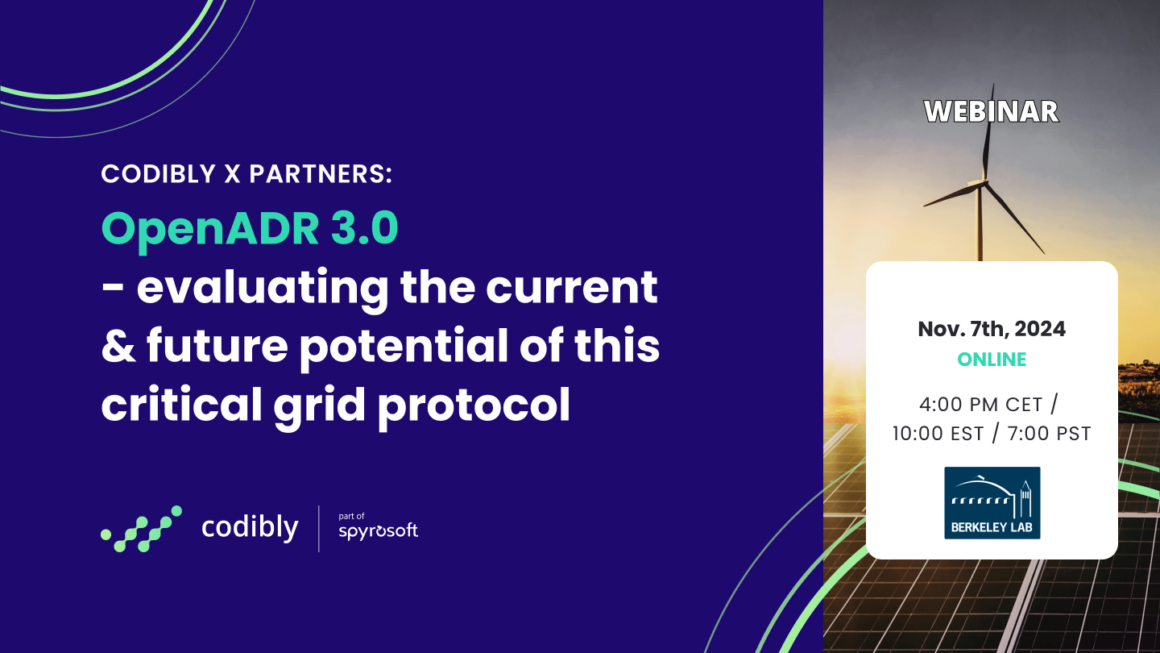Webinar: OpenADR 3.0 – evaluating the current and future potential of this protocol

Missed our recent webinar on OpenADR 3.0 and its transformative role in Demand Response (DR) and Distributed Energy Resources (DER)? Here’s a quick recap to get you up to speed!
Watch the webinar by OpenADR Alliance and Codibly
Hosted by Bruce Nordman from Berkeley Lab and Spencer Borison from Codibly, the session explored the latest advancements in DR and grid communication. Key topics included how OpenADR 3.0 is evolving to become the unifying protocol for global energy markets, similar to how HTML unified the web. The speakers delved into the importance of local price servers, capacity management, and standardized pricing, highlighting how OpenADR 3.0 can harmonize energy protocols across regions and customer types. This evolution in energy management paves the way for more efficient and sustainable energy solutions on a global scale.
Watch the full session here to learn how OpenADR 3.0 is advancing smart energy solutions and grid integration:
The OpenADR 3.0 webinar explored the exciting ways OpenADR 3.0 is shaping the future of demand response (DR) and distributed energy resources (DER). This new version of OpenADR has been designed to make grid communication easier, faster, and more accessible, opening up new possibilities for businesses in renewable energy, demand flexibility, and energy management.
Spencer and Bruce explained how OpenADR 3.0 improves on its predecessor, OpenADR 2.0b, by streamlining integration with modern technologies like REST API and JSON. These updates replace the older, more complex methods, making it simpler for utilities and OEMs to adopt and implement OpenADR integration quickly and securely. This shift allows businesses to better manage energy demand, optimize their resources, and ultimately achieve greater efficiency with less hassle.
They also discussed the benefits of “highly dynamic pricing,” which adjusts electricity rates in real-time to reflect current grid conditions. This dynamic pricing feature is a game-changer for companies looking to adapt to fluctuating energy needs every day. By offering real-time price signals, OpenADR 3.0 supports a flexible energy system that benefits grid operators, aggregators, and consumers by enabling smarter, more efficient load management.
Another key topic was how OpenADR 3.0’s integration capabilities support a unified global energy market. The protocol allows for easy communication across different grid systems, enabling local control over flexible loads and ensuring interoperability between grid operators, aggregators, and OEMs. This opens up exciting possibilities for distributed resources and connected devices to work seamlessly across regions and technologies, making OpenADR 3.0 a valuable tool for businesses looking to expand in the clean energy space.
Codibly also highlighted their integration solutions with their “Accelerators” model, offering a flexible, ready-to-deploy option for OpenADR 3.0 as well as other key protocols like IEEE 2030.5 and OCPP. This model strikes a balance between turnkey solutions and customized development, allowing businesses to integrate OpenADR efficiently while keeping full control of their codebase.
verall, this session underscored OpenADR 3.0’s potential to drive innovation in energy management, helping businesses stay ahead in an evolving market. For companies involved in DR, DER, and grid communication, OpenADR 3.0 is quickly becoming an essential protocol to support a smarter, more connected, and sustainable energy future.
For more insights or questions, feel free to contact Spencer Borison and Bruce Nordman.
Contact Codibly for more information
For personalized insights on OpenADR, EcoPort and CTA-2045 and its applications, reach out to Spencer Borison. Spencer can provide expert advice on integrating OpenADR standards into your projects.
Schedule a consultation through his calendar link below.
contact us
Need expert guidance on your next energy project?
Reach out to us and discover how Codibly can offer tailored solutions to drive your business.